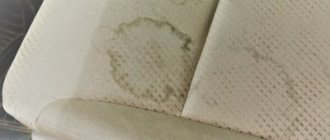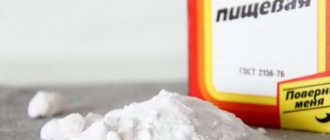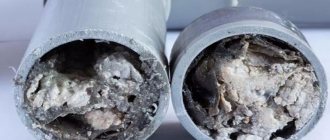This problem requires a mandatory solution. Mechanical methods, special purchased products and simple home recipes will come to the rescue.
We will tell you more about how to eliminate the unpleasant smell of sewage from the kitchen sink in this article.
How to remove using folk remedies?
Most often, the problem with sink odor is due to a clog. You can cope with the task in simple ways, using available tools.
Vinegar with soda
Organic deposits can be removed using vinegar and soda. How to use:
- pour ½ cup of soda into the drain;
- pour in 1 glass of vinegar;
- leave to react for a quarter of an hour;
- rinse with plenty of water.
Salt
Salt has the property of softening fatty deposits, so its use will help in untreated cases.
To unclog your kitchen drain and remove deposits that can cause an unpleasant odor, use regular kitchen salt.
Application:
- Pour 1 cup of salt into the drain.
- Pour in 400 ml of boiling water.
- Leave for 3 hours.
- Rinse with plenty of water.
Salt and soda
To treat the siphon and eliminate odors from it, you can use a mixture of salt and soda. This method is mild in impact and does not help in all cases.
Processing process:
- pour ½ cup of salt into a separate container;
- add ½ cup of soda;
- mix;
- pour the mixture into the drain;
- wait 30 minutes;
- rinse with boiling water.
It is advisable to repeat the procedure several times until the unpleasant odor is completely eliminated.
Lemon acid
A packet of citric acid can be used to neutralize the odor. The powder is poured into the drain and poured with a glass of boiling water . Leave the sink in this form for at least half an hour, after which it is rinsed with hot water.
Dry mustard
Mustard powder can help cope with the smell from the sink, but in case of a clog this method is ineffective.
The principle of operation is similar to the previous methods:
- Pour ½ cup of powder into the drain.
- Pour 1 cup boiling water.
- Leave to stand for 30-60 minutes.
- Rinse with boiling water.
Watching the car wash
In some cases, you can deal with the bad smell from the sewer on your own. Let's figure out when you can do without calling a specialist from technical services.
First, let's watch the washing machine in action. You should pass a large volume of the hottest water possible; if it flows well, does not stagnate, but the smell does not become weaker, try flushing the drains with home remedies (recipes are given below in the article) or products containing aggressive chemical compounds.
If the problem is deposits and fat that have begun to emit a putrid odor, then you can deal with it.
If cleaning the pipes did not help, then we will carefully examine the siphon and the pipes underneath it. All parts of the sewer system must be dry; if there is a leak somewhere, it must be repaired.
The pipes must be intact, without chips, all connections must be free of wet marks. There is a mess - fum or plumbing sealant will come to the rescue.
Plumbing sealants that are suitable for the kitchen:
- acrylic;
- silicone;
- silicone-acrylic.
The most popular are silicone sealants , they are optimal for the kitchen - they have excellent bonding properties, withstand temperature changes, and retain moisture well. The disadvantages include the cost of the product.
Acrylic sealants are durable and more affordable, but due to their lack of elasticity, seams can become depressurized over time. Therefore, it is better to choose another option, or to vigilantly monitor the condition of all sewerage elements.
Silicone-acrylic sealants , as the name implies, combine the best qualities of the above sealants.
If we open the tap and observe, we will notice that the water is slowly draining, standing in the sink, and we have a blockage.
TOP 3 special preparations for cleaning pipes
A large number of drugs are produced for sewer care . They have a complex effect - they remove blockages, disinfect and remove a specific unpleasant odor.
Domestos gel for removing blockages
The product is intended for cleaning pipes. The gel is suitable for cleaning sinks, showers and bathtubs. The drug eliminates unpleasant odors and disinfects. Contains chlorine and nonionic surfactants.
Application:
- pour 0.25 liters of product into the drain directly from the package;
- leave for 15 minutes;
- rinse with plenty of hot water.
The average price is about 300 rubles per bottle.
Tiret Professional
Tiret Professional gel is designed to restore the permeability of metal and plastic pipes and eliminate odor. The product has an antibacterial effect. Contains nonionic surfactants and chlorine. Manufacturer - Russian Federation.
Application:
- Pour ½ bottle into the drain.
- Leave for 5-15 minutes.
- Rinse with plenty of water.
The average price is 420 rubles.
Mr.Muscle pellets
The drug is available in granular form. The main purpose of the product is to clean pipes and eliminate odors. Contains soda.
Application:
- pour the contents of the bag directly into the drain hole;
- pour in 1 glass of warm water;
- leave for half an hour;
- drain with plenty of water.
Each bag contains 70 grams of powder, which is enough to treat one drain hole. The average price is 90 rubles per sachet.
Adviсe
Odors must be eliminated promptly. Several recommendations will help you combat them:
- For effective cleaning, use a cable. It helps to quickly break through the blockage. Instead of a cable, you can use a plastic bottle cut into a thin strip. Insert it into the drain with rotational movements until the very end, and then remove it.
- A good way to clear a blockage is a plunger. It creates vortex flows that carry all the debris and dirt out.
- After cleaning with a chemical agent, you can break through the contamination with a powerful jet pressure. You need to turn on warm water.
Attention! Before cleaning the system and removing the siphon, you should place a basin or bucket to drain the water.
Mechanical ways to solve the problem
In cases where the cause of the stench from the kitchen sink is a clog, conservative methods of exposure through exposure to various solutions may not always be effective.
If the problem is pronounced, time-tested cleaning techniques will come to the rescue:
- disassembling and cleaning the siphon;
- using a plunger;
- using a plumbing cable.
plunger
A plunger is a pipe cleaning tool with a plastic or wooden handle and a rubber cap. Its use will help clear the blockage without dismantling the siphon. Drain cleaning is done by creating pressure.
For two-section sinks, you need to use either 2 plungers at the same time or plug one of the drain holes tightly.
Usage:
The plunger is placed vertically above the sink drain hole with the cap facing down.- Fill the sink with hot water to cover the plunger nozzle.
- By making progressive movements up and down, you can get rid of the blockage, and, as a result, the stagnation of organic matter and the unpleasant odor.
- Raise the plunger sharply above the water.
- Repeat the procedure.
- Run hot water into the sink.
- Rinse the Sami sink.
Cable
To clean the sewer, a special metal cable several meters long is used. At one end of this device there is a splitting like a brush or a hook, at the other there is a handle.
Cleaning takes place by rotating the handle and passing the cable through the sewer pipe . When the cable is screwed in, debris gets caught on its end, which is then removed. To properly clear the blockage, it is necessary to carry out cleaning in several approaches; one approach is not enough.
After clearing the blockage, the cable must be cleaned, dried and lubricated with oil. Store the instrument rolled up.
Siphon cleaning
If you suspect that a lot of food deposits have formed in the siphon under the sink, you can check this by disassembling the siphon.
Modern designs are quite easy to disassemble and also easy to install. After mechanical cleaning of the removed siphon, it is installed back.
Why does the kitchen smell like sewer?
Before you begin the active phase of getting rid of the fetid sewer odor, you need to find out the reasons for its appearance.
- The siphon is clogged. This unit is the first to encounter leftover food, grease and other kitchen waste. And not all of them can easily pass through it further into the sewer. But even those that pass through partially remain on the inner walls of the pipes and directly in the siphon. As a result, it is the siphon that stinks, and not the sewer, and everything will return to normal if the siphon is washed or replaced with a new one.
- The sink is not used. In this case, the siphon is also to blame, but not because it is clogged, but on the contrary - because there is nothing in it, not even water. Full functioning of the siphon is impossible without a certain amount of liquid inside it. The purpose of this liquid is to create a so-called water seal, which is the only barrier that prevents the penetration of air and gases from the sewer system.
- The siphon is not assembled correctly. The installation process is quite simple and an error is possible only due to ignorance and unwillingness to obtain this knowledge, since the manufacturer included instructions with pictures in the product. Correct assembly depends on the design of the siphon, and even a minor flaw leads to the fact that a water seal is not formed. As a result, the unpleasant smell from the sewer easily enters the room.
- Air lock in the riser. The first sign of airiness in the system is the slow drainage of water and the accompanying gurgling sound. In multi-storey buildings, the only solution is to call a plumber from the housing office. If this is a private residence, the problem is in the home sewer system, which can be clogged at a considerable distance from the sink.
- Insufficient sealing between the riser and the corrugated pipe. The diameter of the riser inlet may not correspond to the outer diameter of the corrugated pipe that comes with the siphon. If you connect these two elements without a rubber seal or adapter, the smell will enter the room directly from the main riser.
- Sagging corrugated pipe. During operation, the corrugation stretches and may sag. As a result, the drainage is disrupted: wastewater either stagnates in the sagging area of the pipe, or flows out completely, leaving no water seal.
- Damage to pipes or siphon. Over time, the plastic on the corrugated pipe becomes less elastic, which contributes to its cracking. As for other pipes or a siphon, this can only happen to them as a result of direct destructive influence from the outside.
Nothing helps: what to do?
Not in all cases, an unpleasant odor can be eliminated with homemade or special remedies. For some reasons, it will be necessary to carry out plumbing work.
Such circumstances include:
- incorrect installation;
- dried out gaskets;
- physical damage to the sewer drain system;
- airing of the entire riser.
The solution to the issue in this case is to repair the drain system, replace individual parts or the entire assembly.
To determine the source of improper sewerage operation, the best solution is to call a plumber . If the riser becomes airy, contact the company responsible for maintaining public communications.
When is plumbing work needed?
If you've tried all the ways to clean your pipes and your sink still smells, it's time to call a plumber. Work to be carried out by a specialist:
- reinstall the incorrectly installed siphon;
- replace dried out seals;
- determine the location of sewerage damage;
- eliminate the air lock in the main riser.
Having your drain system repaired by a professional is guaranteed to save you from this unpleasant problem.
Prevention
Using preventive measures, you can not only avoid the appearance of unpleasant odors from the kitchen sink, but also significantly reduce the likelihood of clogs.
Such measures include:
- Cleaning pipes using special products or simple recipes should be done periodically. The frequency recommended by experts is at least once a month.
- Residues of food, dried tea leaves, etc. should not fall into the drain. Large particles that fall into the drain will mostly settle in the siphon. Overgrown with fat and decomposing, they will become a source of unpleasant odor and impair the permeability of pipes.
- It is advisable to trust the installation of plumbing and water communications to professionals.
- In case of a long trip, you can pour a couple of tablespoons of vegetable oil down the drain. This will help prevent water from evaporating from the siphon and sewer odors from entering the kitchen.
- It is recommended to finish washing greasy dishes by pouring a large amount of hot water down the drain.
How sewer smell can harm you
The rotting smell from your sink can lead to health problems. The fact is that the rotting that occurs in the siphon is accompanied by the release of gases hazardous to health. They can cause malaise, headaches and a number of other negative effects.
Among the substances released through the sewer pipe are: hydrogen sulfide, ammonia and methane. Ammonia and hydrogen sulfide have the most obvious odor, while methane has no odor at all. If you inhale gases for a long time, the consequences will come quite quickly. First of all, the nervous and respiratory systems are seriously affected.
Recommendations
In order to remove odor from the kitchen sink quickly and efficiently, it is recommended to follow the advice of experts:
The use of household chemicals for cleaning pipes must be done with rubber gloves, observing all safety requirements.- During one procedure, several drugs cannot be poured into the drain at once.
When combined in place, they can form very caustic compounds that release toxic gases. There is also a possibility that drugs that are not designed for simultaneous use will neutralize each other's effects. - Drain cleaning products must be stored separately from food products, out of the reach of children.
If you rarely use the sink
It happens that at a certain period of life the kitchen sink is rarely used, the water in the water seal evaporates, and the kitchen is filled with a pungent sewer spirit. Or, for example, people come to their country house only on weekends, and it’s not pleasant to immediately experience negative emotions because of this problem.
If you live in a house that doesn't use the sink much, just turn on the faucet periodically and let the water run for a while, cold or hot doesn't matter.
If you leave the house for a long time, the water has time to dry, your task is to prevent drying out. Let's remember physics lessons. Oil will come to our aid; it is lighter than water, will spread like a film and will not allow evaporation to occur. You can use whatever oil is on hand - vegetable oil, or you can add a little machine oil.
How to get rid of sewer smell in the bathroom
Maybe:
- washing machine drum or drain;
- a hole in the bottom or side to drain water;
- toilet;
- basket with dirty laundry;
- space under the sink, bathroom, behind the washing machine;
- ventilation system.
Advice! Before you start searching for the source of the smell, you must first ventilate the room, remove the smell from under the bathroom, wash the sink, pipes and connections. This will make it easier to identify the problem or damaged area.
Improper installation of communications
If residents who have moved into a new house feel a not-so-pleasant “aroma” in the rooms, perhaps the builders or DIYers made mistakes when installing the sewer system.
Due to violations associated with the laying of pipes - especially non-compliance with the angle of inclination, which is prescribed in the standards, wastewater in the pipes can stagnate, causing a specific odor.
When laying a sewer system, it is important to comply with engineering requirements: all work must be carried out in strict accordance with current regulations
A radical way to get rid of the stench will be a complete replacement of communications with the installation of a new system in strict accordance with technical specifications.
In some cases (when using metal-plastic pipes), the situation can be saved by adjusting tightened pipe connections, replacing gaskets, and installing specially selected sealing collars.
In order to prevent clogging, it is periodically necessary to flush the sewer system, the rules for which will be introduced in our article.
Sources of stench: common options
Modern houses are equipped with a sophisticated sewer system designed to remove residual waste products.
Its operation is accompanied by specific odors, since wastewater flowing through the pipes emit hydrogen sulfide and other unpleasant-smelling substances. When the sewerage system is working properly, the “aroma” in the premises (including the bathroom, kitchen, toilet) is almost imperceptible. Its appearance indicates a malfunction in the functioning of technical communications or plumbing fixtures.
When a sewer smell appears, it is important to determine its source. If this cannot be done on your own, it is important to immediately contact a specialist. The most common causes of stench can be:
The most common causes of stench can be:
- Mistakes made when installing the sewer system. The appearance of odors in the room may be due to improper installation of pipes or loose connections.
- Burst of a sewer pipe in the central or apartment distribution system. A leak can be either obvious or almost invisible: a microcrack or a joint not treated with sealant is often enough for gases and moisture to leak through.
- Inadequate assembly quality of the siphon or its malfunction. This component of plumbing design plays an important role in preventing the entry of foul gases.
- Blocked pipes or drains. Household waste, hair, and food waste that accumulate in siphons or pipes begin to rot, releasing a specific “aroma.”
- A malfunction in the operation of the water seal, as a result of which the “water plug” is destroyed, which prevents the appearance of sewer odors.
- Defects in the functioning of ventilation, which is equipped in apartment and private buildings. The system is designed to remove stench from the sewer system; If she doesn't do a good job, the stench penetrates the apartments.
- Incorrect connection or violation of operating instructions for the washing machine. In some cases, a useful unit becomes a source of a specific odor.
In addition to those listed, there are many other reasons that cause “odors” in the room. Some of them are easily removable, others require the help of specialists, and often extensive, expensive work.
Below we will look in detail at the various sources of stench and tell you what measures need to be taken in specific cases.











